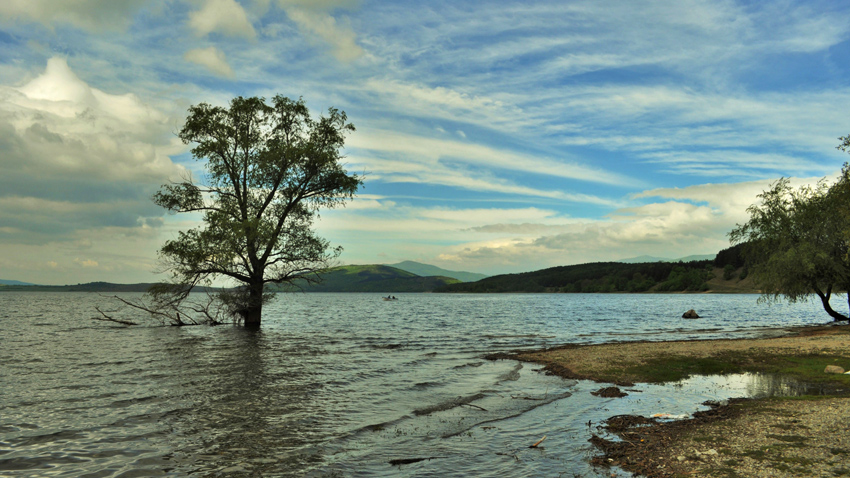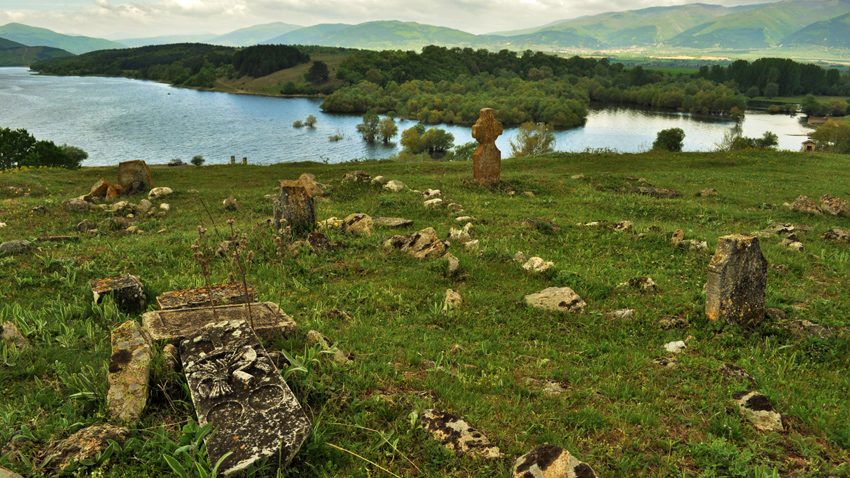Is it easy to demolish a house that has been built up with lots of pain and love? How does one leave his or her birthplace for good? Then who can bring back the lost faith, the harmony of childhood, the innocence? Thousands were forced to ruin and leave their homes in the middle of the last century when then communist Bulgaria fell victim to a construction fever. The reason? The deportation of entire regions with the purpose of building dams with HPPs that were to boost the planned socialistic economy in a powerful way. Who would bother to think about the people left homeless, the broken destinies and the separated families? Their progeny still can’t get rid of the terrific nightmare – for instance the successors of the Zapalnia village with its remains lying on the bottom of the Zhrebchevo Dam.

It looked like some omen hanged over the peaceful village, situated at the foot of the Balkan range and lost amidst the scents of the Rose Valley since its establishment back in the 15th c. In the distant past a sudden sweep of the Tundzha River flushed it away and many of its inhabitants died. The survivors of the disaster established a new village and named it Azaplu /Turkish for suffering, pain/ and later its people turned it into the Bulgarian Zapalnia. The life of those people wasn’t easy at all back then, though the land was fertile. During the socialist period that was the region with the greatest number of rose plantations in Bulgaria. Zapalnia had its school, community center and a wonderful church. “I remember it as a magnificent, richly decorated castle, as a fairytale. It was the largest building around. My grandma used to take me there quite often and I always remained dazzled by its unseen beauty,” 59-year-old Mitko Denchev recalls. St. John of Rila – that was the name of the church. Today only its walls can be seen, floating like some ghost ship on the waters of the Zhrebchevo Dam. Fate was about to hit in a devastating manner the village and its inhabitants in the middle of the 20th century. An official decree arrived from Sofia in the 1960s, ordering to the population to move due to the forthcoming building of a dam. People got worried and frightened – where would they go? Mitko was 7 back then. “They gave us less than a year,” he said and added:
“That was the period for deportation and people had to take whatever they could carry. The decree caused serious concern. They were allowed to demolish their houses, so that they could later use the bricks, shingles and beams for the construction of their new homes. Many opted for the towns of Tvarditsa and Kazanlak. The state-owned agriculture and forestry farms provided vehicles. The state promised compensations, but the sums paid were significantly lower,” the witness tells.
The people pulled down the buildings, the school, where Mitko had already spent his first year, the community center etc. They loaded everything and took off. However, no one touched the church. “Nobody would dare to demolish the temple for any reason. Even during the socialist era the people here had their faith, they went to the church every Sunday,” Mitko recalls.

In the early spring of 1965, two years after the deportation, muddy waters flowed among the remains of Zapalnia. A group of people gathered on the hill above the village, where the abandoned cemetery can be seen to this day. Those came to say farewell to their birthplace. Mitko Denchev went on to say:
“It all looked like after a bombing due to the deportation bustle. When they started to fill in the dam, every last remain was flooded. The people watched from the hill and wept. They said: “Look, that was where our house could be seen, there used to be our piece of farmland and now there is nothing. It is all underwater. It is all over!”
English version: Zhivko Stanchev
Photos: Veneta NikolovaThe first modern Christmas was celebrated in Bulgaria in 1879. It followed a European model with a Christmas tree, ice skating and gifts. At that time, the young Alexander Battenberg, who had just become the Prince of Bulgaria, took it upon..
Today, the Bulgarian Orthodox Church commemorates St. Naum of Ohrid. Naum was a medieval Bulgarian scholar and writer. He was born around 830 and died on December 23, 910. He was of noble origin but he left everything and followed the Slavic..
With the blessing of His Eminence Metropolitan Arsenii of Sliven, a copy of the miraculous Athonite icon of the Most Holy Theotokos "She Who is Quick to Hear" was welcomed at the Saint George the Victorious Monastery in Pomorie. The Bulgarian..
The first modern Christmas was celebrated in Bulgaria in 1879. It followed a European model with a Christmas tree, ice skating and gifts. At that..
Today, the Bulgarian Orthodox Church commemorates St. Naum of Ohrid. Naum was a medieval Bulgarian scholar and writer. He was born around 830 and..

+359 2 9336 661
